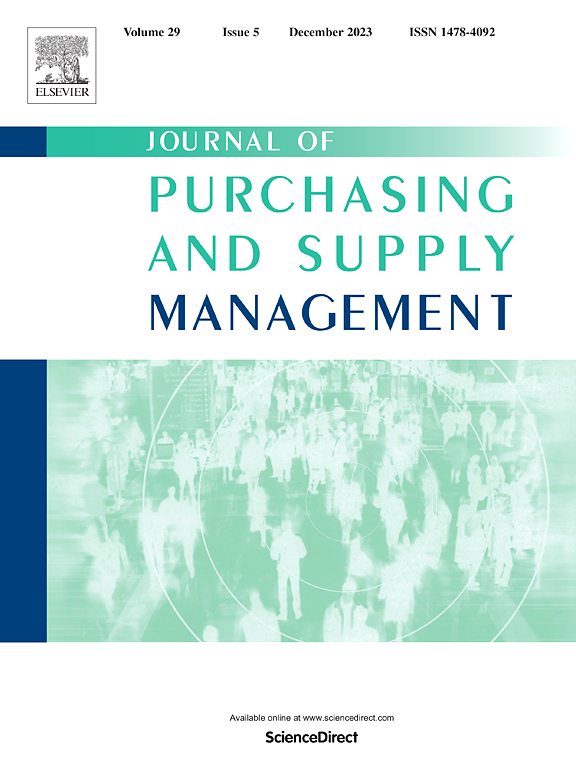The role of blockchain technology in supply chain relationships: Balancing efficiency and relational dynamics
IF 8.7
2区 管理学
Q1 MANAGEMENT
引用次数: 0
Abstract
The increasing adoption of blockchain technology (BCT) is transforming operations and relational dynamics within agri-food supply chains. Despite a growing number of studies, the impact of BCT on supply chain relationships remains underexplored. This research identifies the salient elements of the link between BCT and relationships. It explores these empirically to understand the impact of BCT adoption and implementation on supply chain relationships in the agri-food industry, relying on social exchange theory and focusing on trust, formal information flow mechanisms, and quality of information flows and communication.
This study undertakes a multiple qualitative case study analysis of seven Italian companies involved in the agri-food industry operating in the wine, beer, and dairy sectors who are considered pioneers of BCT adoption. The results indicate a positive impact of BCT on the automation of supply chain contracts and operational efficiency, on one hand, and the increased quality of relationships, on the other. Supply chain coordination is required for BCT to be effective. In highly concentrated sectors, the contractual power exerted by big players is a vital factor, while in more fragmented and dispersed industries the role of persuasion, relationships, and supply chain contracts are key.
Three key insights emerge and are discussed. These concern: (i) the rethinking of the role of trust in supply chain relationships impacted by the adoption of BCT; (ii) the enhancement of information-sharing and flow mechanisms in supply chain relationships through the adoption of BCT; and (iii) the optimization of information flow quality and communication dynamics through the adoption of BCT.
This study contributes to the existing literature by providing novel empirical evidence regarding the impact of BCT on relationships. It further contributes to the existing literature by analyzing the impact of blockchain applications on the upstream and downstream levels of the supply chain from a management perspective and by identifying the beneficial exchanges, norms, and principles that shape interactions when BCT is implemented.
区块链技术在供应链关系中的作用:平衡效率和关系动态
区块链技术(BCT)的日益普及正在改变农业食品供应链中的运营和关系动态。尽管有越来越多的研究,但BCT对供应链关系的影响仍未得到充分探讨。这项研究确定了BCT与人际关系之间联系的突出因素。本文以社会交换理论为基础,以信任、正式信息流机制、信息流和沟通质量为重点,对农业食品行业采用和实施BCT对供应链关系的影响进行实证研究。本研究对七家意大利农业食品行业的葡萄酒、啤酒和乳制品公司进行了多重定性案例研究分析,这些公司被认为是采用BCT的先驱。结果表明,BCT一方面对供应链合同的自动化和运营效率产生积极影响,另一方面对关系质量的提高产生积极影响。供应链协调是BCT有效运作的必要条件。在高度集中的行业中,大玩家施加的合同权力是一个至关重要的因素,而在更分散和分散的行业中,说服、关系和供应链合同的作用是关键。出现了三个关键的见解并进行了讨论。这些问题:(i)重新思考信任在采用BCT影响下的供应链关系中的作用;(ii)通过采用BCT加强供应链关系中的信息共享和流动机制;(三)通过采用BCT优化信息流质量和沟通动态。本研究提供了新的经验证据,为现有文献提供了有益的补充。通过从管理角度分析区块链应用对供应链上下游层面的影响,并通过确定在实施BCT时形成互动的有益交流、规范和原则,进一步为现有文献做出贡献。
本文章由计算机程序翻译,如有差异,请以英文原文为准。
求助全文
约1分钟内获得全文
求助全文
来源期刊

Journal of Purchasing and Supply Management
MANAGEMENT-
CiteScore
10.30
自引率
18.00%
发文量
31
审稿时长
70 days
期刊介绍:
The mission of the Journal of Purchasing & Supply Management is to publish original, high-quality research within the field of purchasing and supply management (PSM). Articles should have a significant impact on PSM theory and practice. The Journal ensures that high quality research is collected and disseminated widely to both academics and practitioners, and provides a forum for debate. It covers all subjects relating to the purchase and supply of goods and services in industry, commerce, local, national, and regional government, health and transportation.
 求助内容:
求助内容: 应助结果提醒方式:
应助结果提醒方式:


